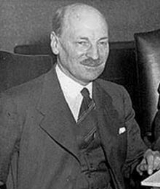Clement Richard Attlee, 1st Earl Attlee,
KGThe Most Noble Order of the Garter, founded in 1348, is the highest order of chivalry, or knighthood, existing in England. The order is dedicated to the image and arms of St...
,
OMThe Order of Merit is a British dynastic order recognising distinguished service in the armed forces, science, art, literature, or for the promotion of culture...
,
CHThe Order of the Companions of Honour is an order of the Commonwealth realms. It was founded by King George V in June 1917, as a reward for outstanding achievements in the arts, literature, music, science, politics, industry or religion....
, PC, FRS (3 January 1883 – 8 October 1967) was a
BritishThe British are citizens of the United Kingdom, of the Isle of Man, any of the Channel Islands, or of any of the British overseas territories, and their descendants...
Labour politicianThe Labour Party is a centre-left democratic socialist party in the United Kingdom. It surpassed the Liberal Party in general elections during the early 1920s, forming minority governments under Ramsay MacDonald in 1924 and 1929-1931. The party was in a wartime coalition from 1940 to 1945, after...
who served as the
Prime MinisterThe Prime Minister of the United Kingdom of Great Britain and Northern Ireland is the Head of Her Majesty's Government in the United Kingdom. The Prime Minister and Cabinet are collectively accountable for their policies and actions to the Sovereign, to Parliament, to their political party and...
of the
United KingdomThe United Kingdom of Great Britain and Northern IrelandIn the United Kingdom and Dependencies, other languages have been officially recognised as legitimate autochthonous languages under the European Charter for Regional or Minority Languages...
from 1945 to 1951, and as the Leader of the
Labour PartyThe Labour Party is a centre-left democratic socialist party in the United Kingdom. It surpassed the Liberal Party in general elections during the early 1920s, forming minority governments under Ramsay MacDonald in 1924 and 1929-1931. The party was in a wartime coalition from 1940 to 1945, after...
from
1935The 1935 Labour Party leadership election took place on 26 November 1935 when Herbert Morrison and Arthur Greenwood challenged Clement Attlee, the incumbent party leader of only one month and one day. Attlee, previously the party's Deputy Leader, had been appointed as an interim leader the previous...
to
1955The British Labour Party leadership election of 1955 was held following the resignation of Clement Attlee. Attlee had been Prime Minister 1945—1951 and had stayed on as leader of the Labour Party until he lost the 1955 general election.-Candidates:...
. He was also the first person to hold the office of
Deputy Prime MinisterThe Deputy Prime Minister of the United Kingdom of Great Britain and Northern Ireland is a senior member of the Cabinet of the United Kingdom. The office of the Deputy Prime Minister is not a permanent position, existing only at the discretion of the Prime Minister, who may appoint to other offices...
, under
Winston ChurchillSir Winston Leonard Spencer-Churchill, was a predominantly Conservative British politician and statesman known for his leadership of the United Kingdom during the Second World War. He is widely regarded as one of the greatest wartime leaders of the century and served as Prime Minister twice...
in the
wartime coalition governmentMembers of the War Cabinet are in bold face.-Source:* D. Butler and G. Butler, Twentieth Century British Political Facts 1900–2000....
, before leading the Labour Party to a landslide election victory over Churchill's
Conservative PartyThe Conservative Party, formally the Conservative and Unionist Party, is a centre-right political party in the United Kingdom that adheres to the philosophies of conservatism and British unionism. It is the largest political party in the UK, and is currently the largest single party in the House...
in
1945The United Kingdom general election of 1945 was a general election held on 5 July 1945, with polls in some constituencies delayed until 12 July and in Nelson and Colne until 19 July, due to local wakes weeks. The results were counted and declared on 26 July, due in part to the time it took to...
. He was the first Labour Prime Minister to serve a full Parliamentary term, and the first to command a Labour majority in Parliament.
The government he led put in place the post-war settlement, based upon the assumption that
full employmentIn macroeconomics, full employment is a condition of the national economy, where all or nearly all persons willing and able to work at the prevailing wages and working conditions are able to do so....
would be maintained by Keynesian policies, and that a greatly enlarged system of social services would be created – aspirations that had been outlined in the wartime
Beveridge ReportThe Report of the Inter-Departmental Committee on Social Insurance and Allied Services, known commonly as the Beveridge Report was an influential document in the founding of the Welfare State in the United Kingdom...
.

![]()
![]()
![]()
![]()

